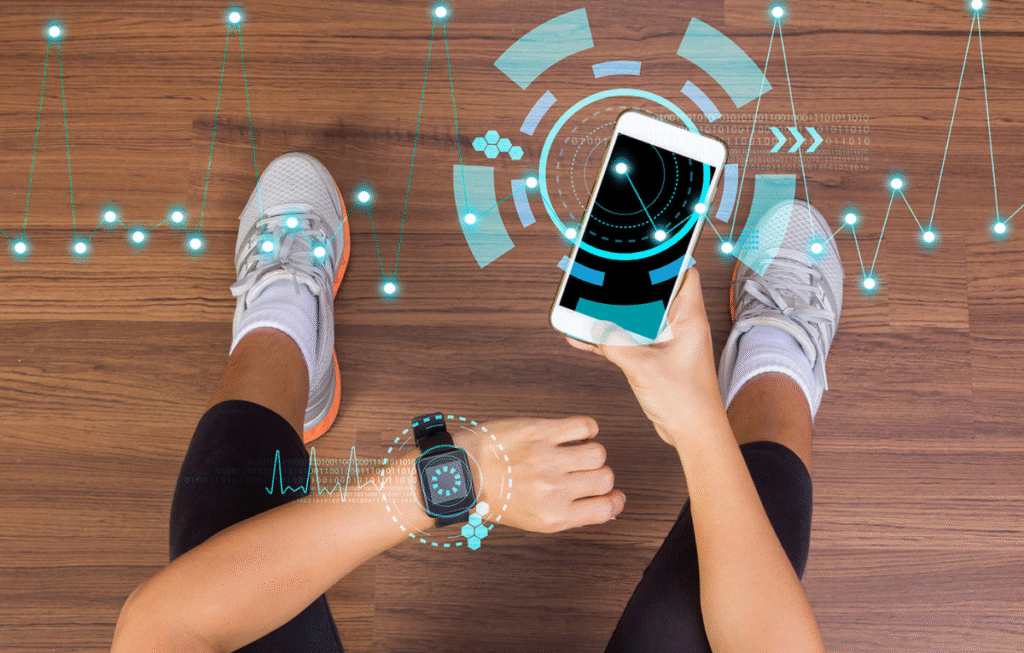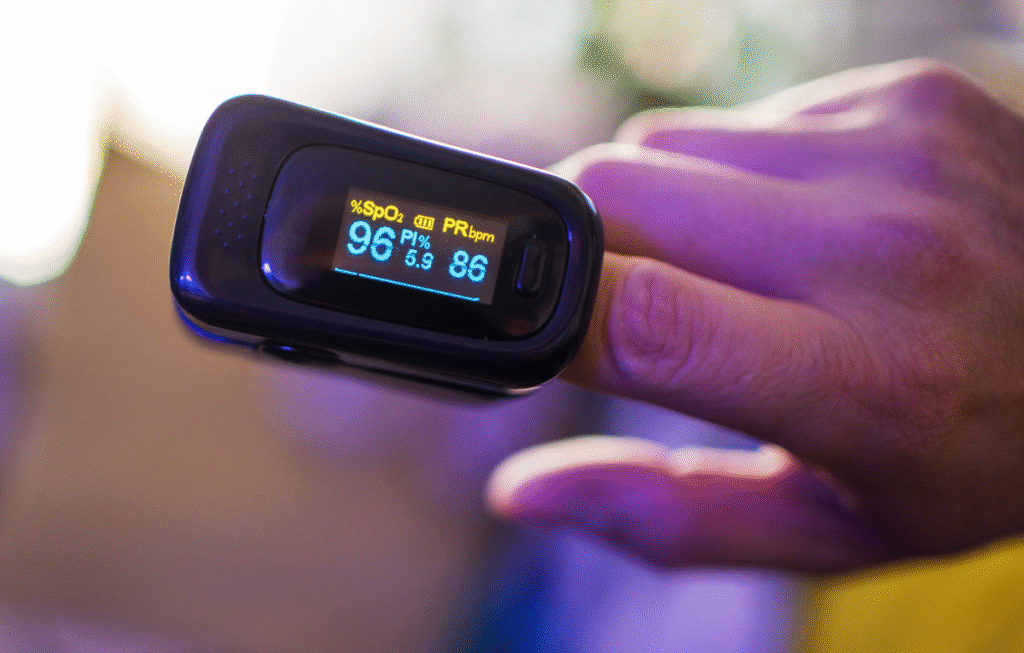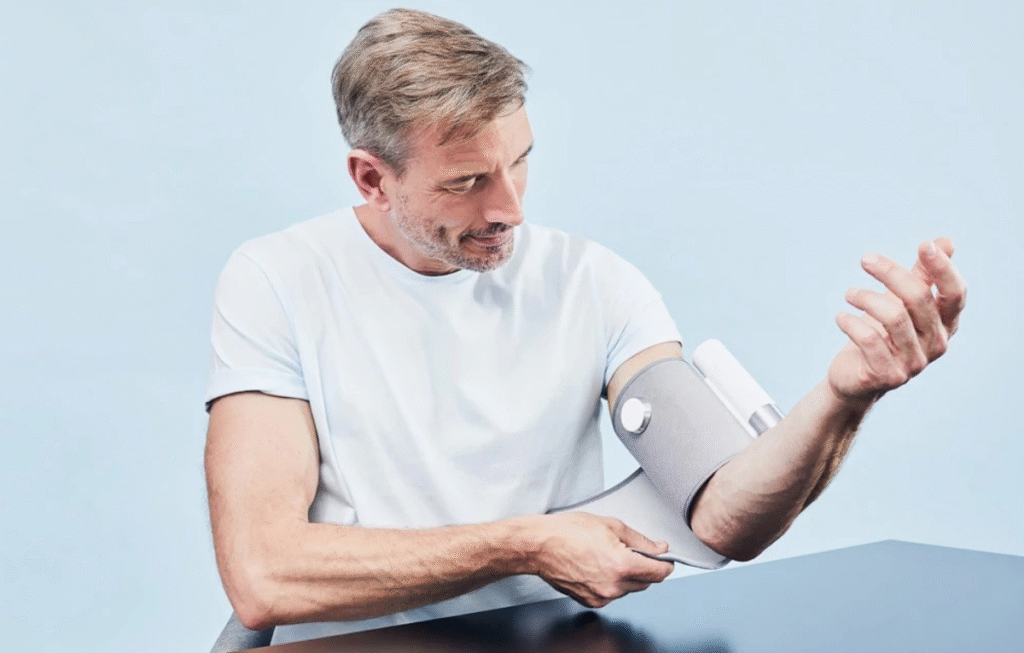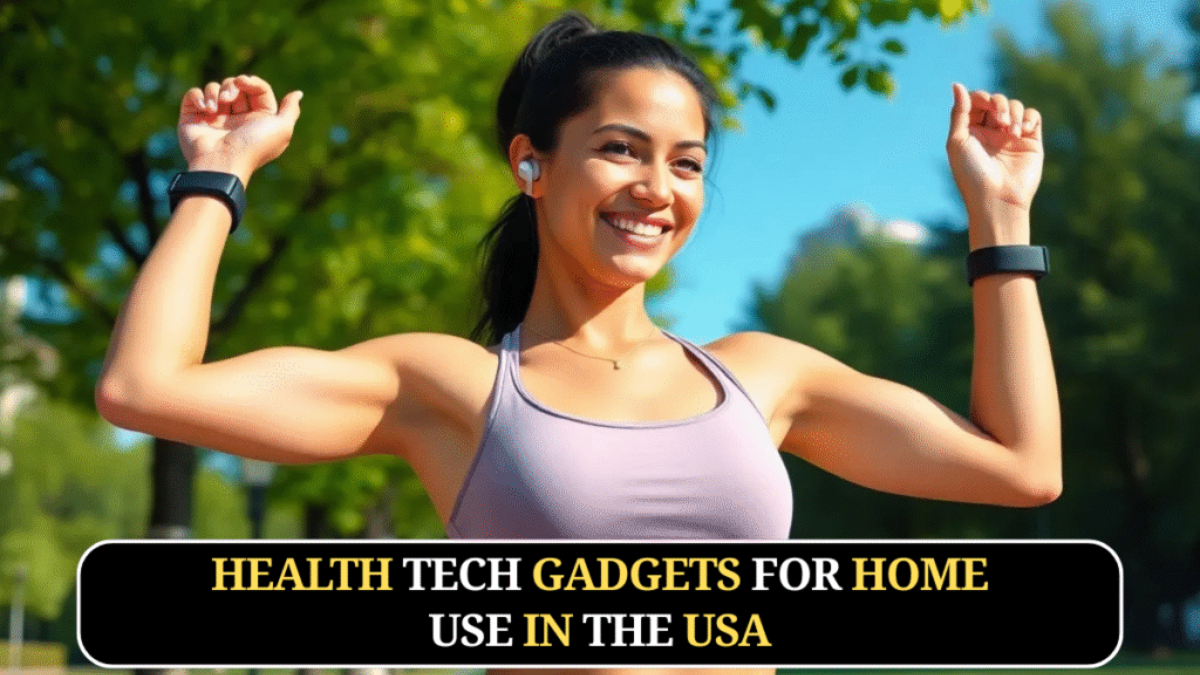Nowadays technology is not just limited to the office or mobile, but it has reached our home and health. Now just a smartwatch or a small sensor can tell your sleeping habits, heart rate, blood pressure, sugar level, time of taking medicine, and even the quality of the air in your room.
If you want to always remain in good health whether you want to control any disease, lose weight, or just live a healthy life then some right health tech gadgets can help you a lot in this.
In this article, we will learn about the 10 most important health gadgets used at home, their benefits, tips to make the right choice, and also how people are making their lives easier by using them.
1. Blood Pressure Monitor (Home Cuff)
Why is it important?
Blood pressure is called the “Silent Killer” because it can increase even without any symptoms. Many times when you go to the doctor, the blood pressure appears to be high or low, which is called white coat hypertension. In such a situation, measuring it at home every day at the right time is very beneficial.

How to choose
- Always take the upper arm cuff, as it gives more accurate readings.
- The display should be large and clear.
- Some monitors have the option of Bluetooth and a mobile app so that you can save your readings.
- Keep in mind that the size of the cuff is according to your hand.
How people use it
Most people measure blood pressure after waking up in the morning and before sleeping at night. Many doctors recommend measuring 2-3 times at a time and noting the average.
Price
Around $40 to $200.
Pro Tip – While measuring, sit comfortably for 5 minutes, keep the hand at the height of the heart, and do not talk.
2. Smart Weighing Scale (Weight + Body Composition)
Why it is important
Health cannot be judged by weight alone. Smart scales also show you body fat percentage, muscle mass, BMI, and changes in your body over time.
How to choose
- The platform should be strong and slip-proof.
- Should connect to apps like Apple Health and Google Fit.
- If multiple people will be using it at home, then definitely check the Multi-User Profile.
How people use it
Most people measure their weight after waking up in the morning and before breakfast. It is better to look at the weekly average rather than looking at small changes daily.
Price
$30 to $300.
Pro tip – Look at readings like body fat % as a trend, because drinking water or changing time makes a difference in it.
3. Wearables (Smartwatches and Health Rings)
Why it is important
Nowadays smartwatches or health rings are not just for telling time. They can record your heart rate, sleep cycle, steps, calories burned, and even ECG.
How to choose
- If you want every feature, then buy a smartwatch like the Apple Watch or Fitbit.
- If you want something light and simple, then choose an option like the Oura Ring.
- For heart health, buy a model with ECG and AFib detection.
How people use it
- To count daily steps
- To check sleep quality
- To track workouts and see calories
- Athletes decide their training by looking at HRV (Heart Rate Variability).
Price
From $80 to $600.
Pro tip – Battery and comfortable fit are very important. Buy a device that you can wear every day.
4. Personal ECG Device
Why is it important?
Sometimes symptoms like rapid heartbeat, dizziness, or nervousness come suddenly. At that time it is difficult to go to the doctor and get an ECG done. Personal ECG devices can be kept in the pocket and can record immediately.

How to choose
- Always take an FDA-approved device.
- Choose a device that can save the report in PDF or image format.
How people use it
Whenever there is a sudden rapid heartbeat or dizziness, immediately record an ECG and show it to the doctor later.
Price
$99 to $200.
Pro tip – This is just a monitoring tool; go to the hospital immediately in case of emergency.
5. Pulse Oximeter
Why is it important?
Since COVID-19, people have started checking oxygen levels. This is especially useful for asthma, COPD, or heart patients.
How to choose
- Take a model that is lightweight and easily fits on the finger.
- The display should be clear and bright.
How people use it
- To monitor oxygen levels in fever or cold.
- To use during workouts or respiratory problems.
Price
$15 to $80.
Pro tip – Always look at the trend; do not rely on a one-time reading.
6. Blood Sugar Monitor (Glucometer & CGM)
Why is it important?
Tracking blood sugar is a daily task for diabetes patients. It tells you how which food or habit affects the sugar level.
Options
- Bluetooth Glucometer – Data is saved in the app by testing with the finger.
- Continuous Glucose Monitor (CGM) – It gives data 24 hours a day but is mostly available on a doctor’s prescription.
How people use it
- To check sugar spikes after meals
- To catch sugar drops at night
- To see the effect of exercise
Cost
- Glucometer: $20–$80
- CGM: Varies, often dependent on insurance
Pro tip – Be sure to consult your doctor and insurance before getting a CGM.
7. Smart Thermometer
Why it is important
Very helpful for parents of children. It not only measures the temperature but also saves the fever trend in the app.
How to choose
- Contactless forehead thermometers are best for children.
- An oral or ear thermometer is good for adults.
How people use it
- To track the trend of the day during fever
- To show the correct data to the doctor
Price
$20 to $80.
Pro tip – Always use the same method so that the readings can be compared correctly.
8. Smart Air Purifier and Air Quality Monitor
Why it is important
Pollution has increased a lot in cities these days. Bad air affects allergies, asthma, and sleep.

How to choose
- Always buy a purifier with a HEPA filter.
- Buy a model with a smart sensor, which automatically runs faster when the air gets polluted.
How people use it
- To reduce allergens and dust by placing it in the bedroom or living room.
- To create a clean environment for children and the elderly.
Price
$80 to $800.
Pro tip – Cleaning and timely replacement of the filter is very important.
9. Smart pill dispenser and reminder
Why it is important
Elderly people often forget to take medicines. Smart dispensers tell the time of medication, and some models also come with alarms or notifications.
How to choose
- Take a model that has a lock system so that the medicine does not come out at the wrong time.
- If you do not live alone, then take a model with notifications so that the family is aware.
How people use it
- A schedule is set by putting out medicines for the whole week.
- The family also gets an alert if the dose is missed.
Price
$50 to $400.
Pro Tip – Connect it to the health app so that the report can be easily sent to the doctor.
10. Sleep and Stress Management Device
Why it is important
Sleep and stress directly affect your health. Lack of proper sleep increases the risk of obesity, diabetes, and heart disease.
Options
- Wearables and rings to track sleep patterns.
- Meditation headbands to teach relaxation and breathing exercises.
- Smart lights to make sleep and wake times natural.
How people use
- To improve sleep habits by checking sleep score
- To control caffeine and screen time
- Meditation or deep breathing practice to reduce stress
Cost
$100 to $400.
Pro Tip – If you suspect snoring or sleep apnea, get a home sleep test done.
Tips for choosing the right gadget
Decide your health goal first do you want to control blood pressure, improve sleep, or manage sugar?
- Always get a clinically validated device.
- Get a model that can export reports in PDF or CSV.
- Choose a device that is comfortable and easy to use on a daily basis.
- Read the privacy policy and avoid sharing marketing data.
Conclusion
Health tech gadgets for home use have become a must in today’s lifestyle. They don’t replace a doctor but give you timely alerts and show long-term trends.
If you want to get started, start with:
- A blood pressure monitor
- A smart scale
- A wearable
- Pulse oximeter or smart thermometer
- Gradually add more gadgets as per your needs.
These devices will help you keep track of your health, make informed decisions, and lead a healthier, balanced, and better life.
FAQs:-
What are health tech gadgets for home use?
Health tech gadgets are smart devices like fitness trackers, blood pressure monitors, or smart scales that help you monitor and manage your health at home.
Which health gadget is best for fitness tracking?
Smartwatches and fitness bands like Fitbit or Apple Watch are the most popular for tracking steps, calories, heart rate, and sleep.
What’s the most useful gadget for seniors?
Blood pressure monitors, glucose meters, and emergency alert devices are especially helpful for senior citizens.
SamhithaHealth & Wellness Content Writer
a Health & Wellness Content Writer with over 6 years of experience creating research-based health articles. She specializes in nutrition, weight management, diabetes care, skin health, and healthy lifestyle practices. Here content is carefully written using trusted medical and scientific sources to ensure accuracy and clarity for readers.

